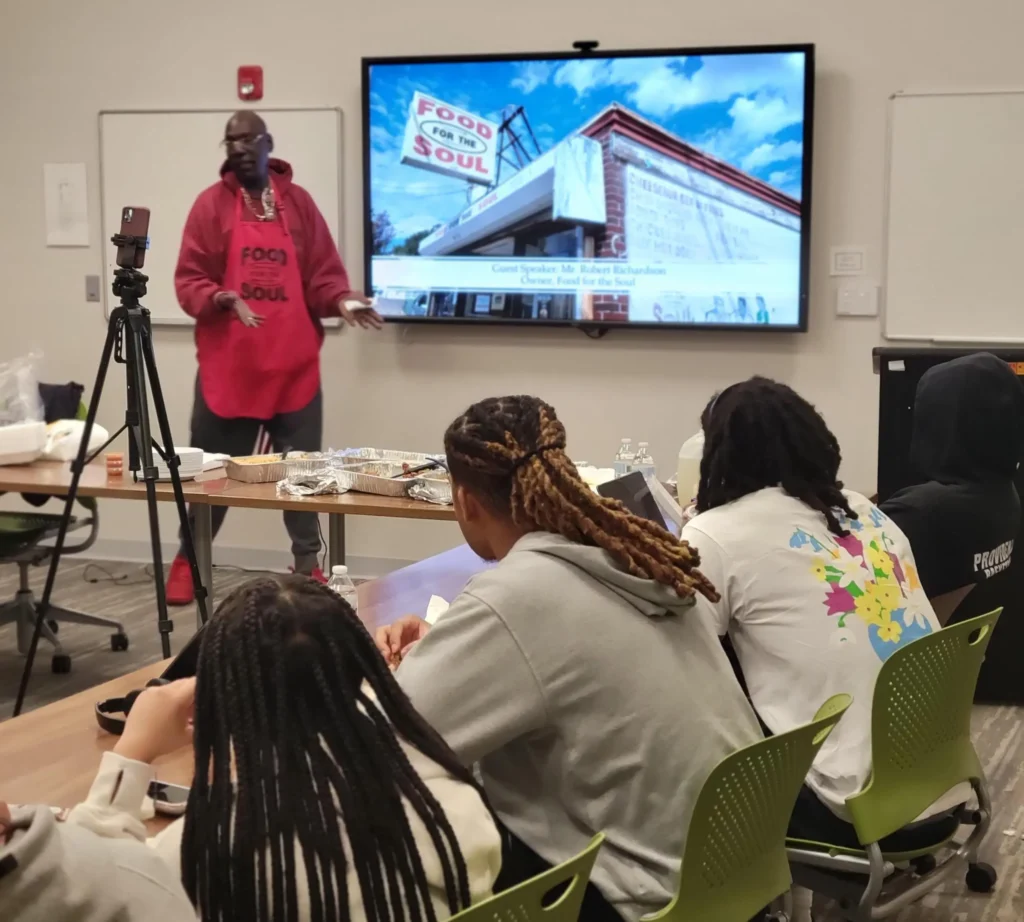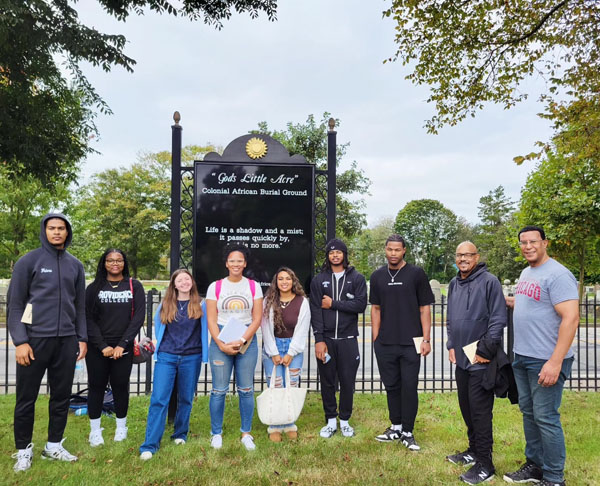February 03, 2025
New course explores the history and experience of Black communities in Rhode Island
By Eva Michelle Wheeler, J.D., Ph.D.
Associate Professor of Black Studies and of Spanish
Wheeler, a socio-cultural linguist and former practicing attorney, has a joint appointment in the Department of Black Studies and the Department of World Languages and Cultures.
The population of Rhode Island from the colonial era through the current day served as primary source material for students in Black Diaspora in Providence, my community-engaged Black Studies course that explores race and racism in Rhode Island through experiential learning in the classroom and beyond.

Black Diaspora in Providence looks to our local community as a window for engaging the cultural, culinary, artistic, and political contributions of Black diasporic populations. Through the course, students explored various communities of African heritage that live in Rhode Island, including African Americans (some the descendants of slavery in Providence and Newport), as well as immigrant communities from West Africa and the Caribbean such as Cabo Verde, Liberia, and the Dominican Republic.
In exploring the Black diaspora in this region, students traced Black diasporic histories, engaged diverse Black identities and communities, and considered contemporary challenges and visions for a more just future for Black Rhode Islanders.
In addition to engaging traditional texts such as books, articles, films, news stories, etc. students also learned about Black communities through food, field trips, workshops, and conversations with invited guests.
This course began as a project in my Introduction to Black Studies class. Back then, I asked students to go out into the city and explore the ways that different communities in the Black diaspora were visible, or invisible, in Providence. As the idea for this course developed, I wanted to keep the experiential learning element, while expanding the possibilities for our analysis.
Guest speakers representing different groups addressed the class, such as Saidah Da Silva ’26, founding president of Providence College’s Cape Verdean Student Association. Da Silva’s presentation was part of a series of integrated learning experiences that combined background readings, cuisine, and local expertise to consider what food and foodways can teach us about history, identity, and culture. In a unit on Black diasporic histories, I invited the Rhode Island Black Storytellers to conduct a workshop on the significance of storytelling in Black communities. Additionally, in a conversation on Black Activism in Providence, students spoke with Jim Vincent, a six-term president of the Providence branch of the NAACP.
As part of a course element titled “food as cultural text, site of memory, and identity,” students studied Black diasporic foodways. With support from a mini-grant from the Office of Institutional Diversity, Equity, and Inclusion, I coupled catered meals from Black-owned restaurants with conversations with local experts on the different types of cuisine. For example, after hearing from Robert Richardson, owner of Food for the Soul on Admiral Street, students tried soul food and asked Richardson questions about the food that he cooked, as well as his history and motivation for cooking.
Other local restaurants included:
- Afrique D’Lounge, Liberian food
- La Gran Parada, Dominican food
- Vicente’s, Cape Verdean food
Students also had opportunities to learn beyond the classroom walls. On one occasion, we visited the Rhode Island Black Heritage Society on the campus of Rhode Island College and engaged a new exhibit on the history and significance of Black churches in Rhode Island. We also took a day trip to Newport in September on the ferry, which offered an opportunity to consider the significance of waterways as sites of oppression and resistance for Black communities in Rhode Island. This fieldwork was supported through a grant from the Center for Engaged Learning.

While in Newport, we took a guided tour of God’s Little Acre, one of the oldest and largest burial grounds for enslaved and free Africans in the United States, with Theresa Guzmán Stokes and Keith Stokes from the Rhode Island Black Heritage Society. The Stokes, who are community partners through the Feinstein Institute for Public Service, taught the students about the lives of people of African descent in Newport from the 1700-1900s. We ended the day with a meal at Humming Bird, a Jamaican restaurant, where the chef and owner discussed the connections between food, culture, and identity.
Over the course of the semester, students prepared unit projects on “Blackness and diaspora at Providence College” and “visions for a just future.” They also kept fieldwork journals for each engaged learning experience, explored research topics for a midterm project. In addition, they designed and implemented their own community engagement projects to organize an event, create educational materials, volunteer for a cause, or another activity that served the community in a meaningful way.
“Even as someone from Rhode island, this course expanded what I thought I knew about Rhode Island history,” said Elizabeth Hien ’25, a sociology and Black studies double major from Lincoln, R.I. “As a college student at PC, the semester-long exploration of the history of the Black diaspora in Rhode Island was incredibly valuable for understanding how it has shaped the local community and, ultimately, Providence College.”
Sociology major Justyn Fernandez ’26 said he enjoyed tasting food from other cultures most, particularly the Liberian and soul food. He also appreciated the opportunity to discuss current events and to hear perspectives without being judged. “What I found interesting about this class was the deep dive we took into the community and learned about how diverse it is outside of the Providence College campus,” he said.
Readings for the course included A Matter of Truth: The Struggle for African Heritage & Indigenous People’s Equal Rights in Providence, Rhode Island, a publication by the Rhode Island Black Heritage Society, and Cabo Verdeans in the United States, edited by Terza Lima-Neves, Ph.D. ’00, a political science professor at Johnson C. Smith University and one of the student founders of Black Studies at Providence College.
The class also read Finding Me: A Memoir by Academy Award-winning actress Viola Davis ’12Hon., who grew up in Central Falls, R.I., and watched documentaries such as High on the Hog: How African American Cuisine Transformed America and “Some Kind of Funny Porto Rican?”: A Cape Verdean American Story.
I plan to offer the course again during the 2025-26 school year, with additional community partners and opportunities to engage local institutions, events, and archives.
Liz Kay contributed to this article.





